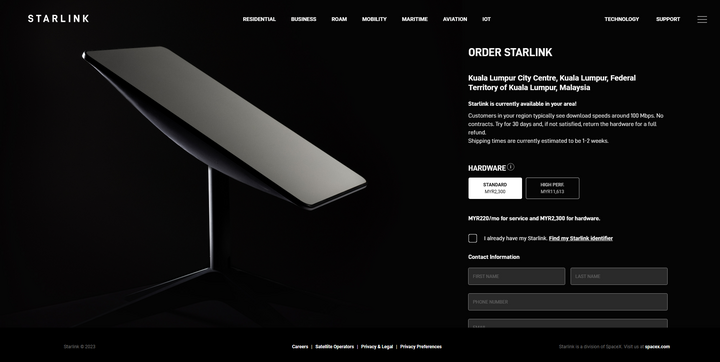The Prime Minister (PM) Dato’ Seri Anwar Ibrahim had a video call with Elon Musk, the CEO of SpaceX and Tesla, discussing about using SpaceX’s satellite network to enhance internet speeds in rural areas of Malaysia more than a week ago.
Following the discussion, the PM has announced that the government would purchase 40 units of Starlink internet devices for universities, colleges, and schools nationwide. If you have been wanting to try satellite-based internet service, you can finally do so.
After receiving the Network Service Provider Licence from Fahmi Fadzil, the Minister of Communications and Digital last week, Starlink officially made the service available in Malaysia.
People living in the Peninsular and East Malaysia can now subscribe to Starlink. The service subscription carries a monthly fee of RM220 with no contract, while the Standard kit, comprising the Starlink dish, a base, a Wi-Fi router, and cables, is priced at RM2,300.

Most individuals will find the Standard kit sufficient. However, those seeking to employ the satellite service for business and enterprise purposes may require the High Performance kit, which comes with a substantial price tag of RM11,613.
What’s The Difference Between Standard and High Performance Starlink?
According to Starlink, the High Performance kit has improved weather resistance, better performance in hot weather, and has better visibility of satellites, thus can connect to more satellites.

However, no matter which kit is chosen, the subscription price remains unchanged, accompanied by a RM100 shipping and handling fee for either option. Additionally, Starlink offers a 30-day return policy for the hardware, allowing customers to receive a full refund if they are not satisfied with their purchase.
According to Starlink’s specs, users can expect typical download speeds between 25 and 220 Mbps, with a majority of users experiencing speeds over 100 Mbps. Upload speeds are typically between 5 and 20 Mbps. Latency ranges between 25 and 60 ms on land, and 100+ ms in certain remote locations.
Please be aware that Starlink primarily targets individuals residing in rural and remote areas, where obtaining reliable internet coverage is challenging. Its main purpose is not to replace existing fibre internet providers like Unifi, TIME, or any other fibre internet services. Instead, it aims to provide high-speed internet access to those who lack adequate connectivity options in underserved regions.
If you are interested, you can head over to Starlink to get started.










